Do you know that most hiring decisions are made within the first five minutes of the interview? That’s not even halfway through the scheduled interview.
But here’s the catch: recruiting based on first impressions can bring low performers into your organization. A deadly mistake when it comes to building an ecommerce team.
Whether we like someone in the first seconds of the interview isn’t predictive of their later performance. That’s why ecommerce managers go through a thorough screening with multiple ecommerce interview questions to ensure they can handle online sales, respond in moments of crisis, and define the business growth prospects.
In this article, you’ll find 20 questions to ask in an ecommerce interview if you’re filling in for the position of an ecommerce specialist. In case you’re applying for the job yourself, you’re in luck too — expect to see the answers to some ecommerce questions below.
Download Guide: Top 20 Ecommerce Interview Questions
Avoid mistakes when hiring talent for your ecommerce team. Download our guide for conducting successful interviews.
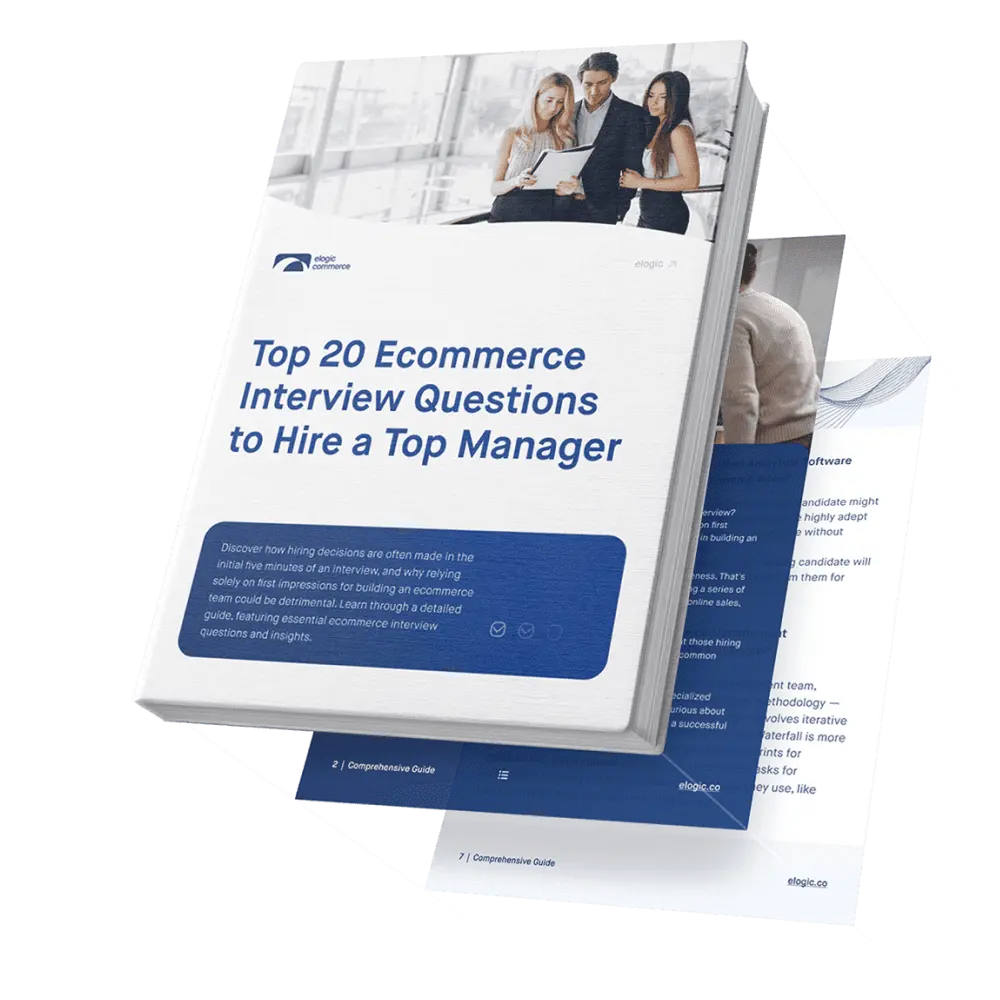
General Ecommerce Interview Questions
An ecommerce interview will always start with general questions. For beginners, they might be as simple as “why are you interested in ecommerce.” For more experienced managers, these might include “what is your background” or “what drives you as a leader.”
Let’s take a closer look at ecommerce questions and answers to kick off your interview.
Question #1: Tell Us About Yourself
The usual icebreaker “tell us about yourself” is one of the most hated interview questions for ecommerce among the applicants. No wonder: they’re ambiguous, it’s hard to identify what answer the interviewer really wants to hear.
In reality, the interviewer lets you loosen up a bit and gives you a chance to introduce yourself. Relate your latest accomplishments in ecommerce, speak of your background experiences, and zero in on your motivations. Use this ambiguity to show the best side of you.
Question #2: How Would You Describe the Core Features of Ecommerce?
The beauty of this question is that it has no right answer. Each candidate will have their own understanding of ecommerce core features based on their prior experience. But there’s one thing they should know for sure: how ecommerce differs from traditional commerce.
An expert ecommerce manager might draw on their strategic decisions through the parts of the marketing funnel or relate to processes automation, such as third-party system integration to manage orders and inform future business decisions.
An ecommerce newbie may think of digital promotional campaigns, must-have website features, and all the other aspects that differentiate the online shopping world from brick-and-mortar stores.
Your task as an interviewer is to use this question to evaluate the seniority of your candidate and their level of awareness of the ecommerce context.
Question #3: What Are Different Ecommerce Models?
This is one of the interview questions for ecommerce beginners or interns. The applicant should relate to B2B, B2C, and other types of ecommerce businesses. You might want to dig deeper into the peculiarities of the model your company uses.
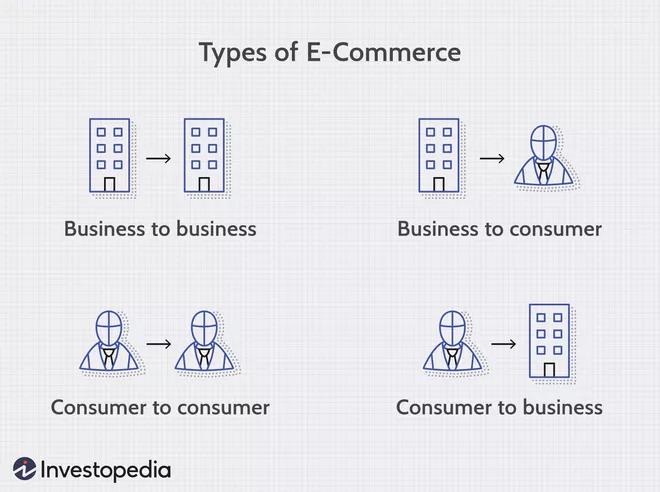
This question also allows you to detect how closely your candidate watches ecommerce latest advances. For instance, the COVID pandemic has accelerated the adoption of a new ecommerce model — direct to consumer (D2C) — thus, calling for operational changes within the organization.
Question #4: What Are the Disadvantages of Ecommerce to Organizations?
A superficial applicant might think this question is too generic and calls for a high school essay. But in reality, a recruiter is asking you one of the most important ecommerce job interview questions: what are the current common risks for ecommerce and how do you mitigate them?
That’s where you showcase your risk management skills. Ecommerce has a lot of hazards, be it privacy & security concerns, customer relationship issues, or immense online competition. Show how you can make your way around these difficulties and which strategy you would apply to overcome the risks.
Find a more detailed guide on the pros and cons of ecommerce on our blog.
Question #5: What Are Some Examples of Ecommerce Companies That Inspire You? Why?
Learning the taste of your potential ecommerce manager can say a lot about their marketing approach. Which brands they are drawn to, how they justify their choice, what their pain points are — this info shows what kind of consumer and, above all, marketer a person is.
As an applicant, choose a few brands you’re trying to emulate in your work. It can be something as famous as Microsoft leveraging mixed reality technology in their marketing campaigns. Or a niche fashion player like Carbon38 transforming their customers into brand advocates with user-generated content and an Ambassador program.
Show your future employer what drives you and how it aligns with their company’s values.
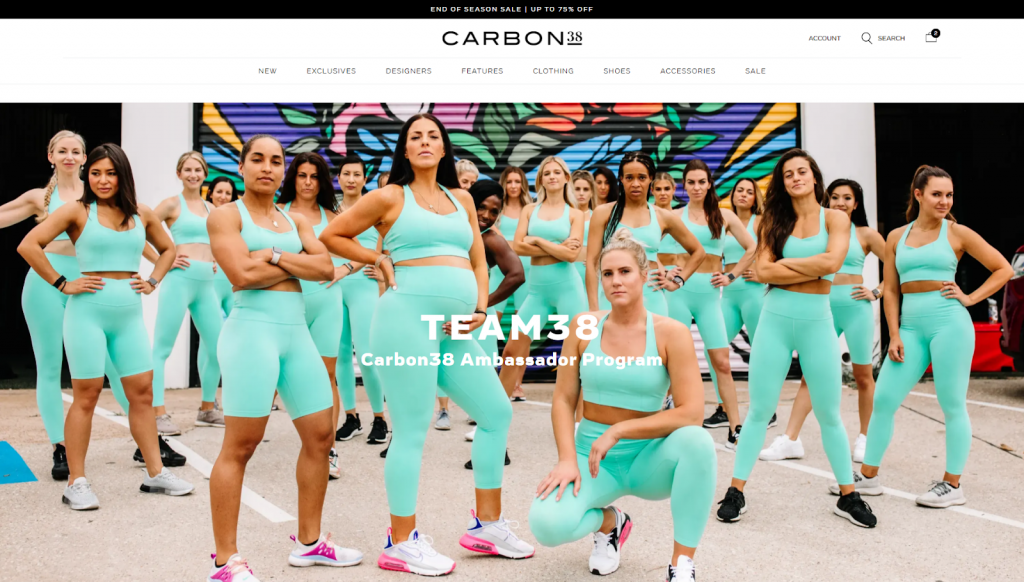
Question #6: Tell Us How You Organize, Plan, and Prioritize Your Work
One of the main ecommerce manager responsibilities is to meet the organizations’ goals while maintaining deadlines. Something which is particularly hard to do when the project goes into the firefighting mode during the high sales season.
As an applicant, you want to showcase your time management skills to the max. Walk the recruiter through your daily work routine, explain how you assess the value of your tasks (urgent vs low-priority), and show how you adapt at the times of organizational uncertainty.
Insider tip: be realistic. No recruiter will believe a candidate who completes a gazillion top-priority tasks per day, never delegates, and manages to maintain a perfect work-life balance. Be honest about how you organize your workload; otherwise, you’ll be just competing with yourself.
Question #7: Why Us [the Name of Your Company]
“Why us” is one of the e-commerce questions that close an interview. At this point, the future ecommerce manager should express their motivation to work for the brand.
This question is extremely important for recruiters hiring for motivational fit. If the employee’s expectations and aspirations align with the company’s values, the ecommerce manager will most likely stay within their role for good.
A few tips for an applicant to answer the why-us question:
- Do your research: make sure you know the company and their product inside out.
- Articulate your values and align them with the company’s culture: do you believe in the same (or at least similar) things your brand does?
- Ask deep questions: these might concern the info on the brand you haven’t found online or the recruiter’s expectations of you as an ecommerce manager.
- Avoid generic answers: the interviewer will be hardly captivated by answers like “because I need the job” or “because I want to work in a top-tier ecommerce company like yours”.
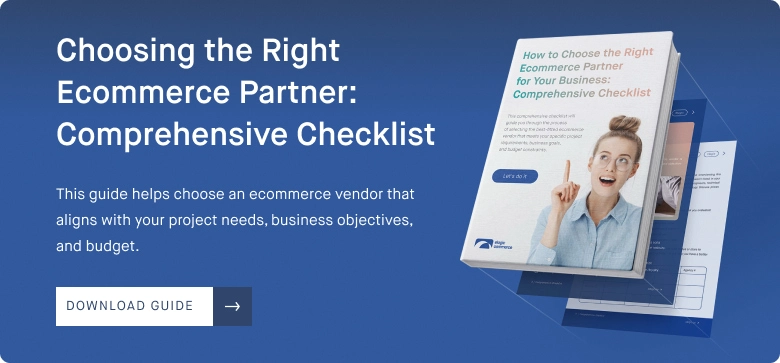
Technical E-Commerce Related Interview Questions
Ecommerce managers may not be keen on programming, but they should be familiar with certain apps and tech concepts to use in their daily routine.
Here are a few ecommerce job interview questions and answers to reveal the candidate’s technical competencies.
Question #8: Have You Ever Used an Ecommerce Platform to Start an Online Store?
Even though an ecommerce manager won’t build a store from the ground up or resolve code-related issues, you want them to be well-versed with an ecommerce platform your store uses. The reasons are manifold as the ecommerce specialist will
- work closely with website developers to monitor the selection of the platform, payment gateways, security practices, etc.;
- use a particular CMS to publish content on the website;
- overlook the inventory details in the inventory management system or in the ERP;
- communicate with the third-party shipping vendors, issue invoices, manage order completion processes.
…and many others.
So even if you haven’t used an ecommerce platform to start an online store, make sure to mention those you’ve worked with. You might provide an ecommerce platform overview and focus on the one that you’re most proficient in.
Question #9: What e-commerce technologies are you proficient in?
You might not need to code as an ecommerce specialist, but you must be familiar with ecommerce technologies available on the market. The more, the better.
The required tech stack will vary from one job position to another, but will most likely include knowledge of CRM, ERP, PIM, shipping & fulfillment systems, etc. Here’s what Jerry Bernhart, one of the veteran executive recruiters in ecommerce, pays strong attention to:
As for technical skills, this is not an all-inclusive list, but I look for candidates who have familiarity with the following:
• Web Analytics tools • Strong knowledge of search engine marketing, and all of its variations • Social media analytics tools • Ecommerce platforms like Magento, Shopify or Demandware • Online advertising tools such as Google Adwords, Google Product Listing Ads (PLA’s) and display ads • Experience working with the major social media platforms including Facebook, Twitter, LinkedIn, YouTube and Google.
You might still need to hire ecommerce developers for the coding expertise. But proficiency in ecommerce software will simplify the work of a skilled ecommerce specialist and make your brand more agile in a competitive online business context.
Question #10: Have You Ever Used Analytics Software With Your Ecommerce Sites?
If the answer to this ecommerce question is no, your candidate might be in serious trouble. An ecommerce manager must be highly adept at crunching and interpreting data, which is impossible without adequate ecommerce analytics tools.
Google Analytics is the minimum requirement. Other tools like Kissmetric or Crazy Egg with their behavioral tracking and visual analytics are also great to have in one’s skill arsenal. A strong candidate will be able to set the required analytics and draw data from them for more informed business decisions.
Question #11: Which Ecommerce Management Methodologies Do You Know?
If your ecommerce manager shall work with an ecomm development team, this question is a must. Some of the most common ecommerce management methodologies include:
- Agile: the project progresses in small portions rather than follows a strict plan. The manager can react and adjust each task depending on the changes in customer requirements & feedback, but it’s harder to predict the final outcome.
- Waterfall: the whole project is planned from start to finish. This methodology might seem a bit rigid and hence outdated, but is great if you’re working with a small team.
- Skrum: the product is created in sprints allowing each team member to contribute their knowledge and skills to deliver high-quality ready-to-use projects.
- Kanban: all the tasks are categorized based on their priorities and allows you to implement changes whenever needed.
It’s worth mentioning the project management applications a candidate uses for their preferred methodology. For instance, at Elogic, we’re fans of Gantt charts for our Agile and Scrum methodologies.
Marketing Ecommerce Executive Interview Questions
Ecommerce managers are vetted marketers. Check out these e commerce questions and answers to evaluate the marketing skills of the applicant.
Question #12: What Are Some Key Metrics to Track in Any Ecommerce Model?
Choose a couple of ecommerce metrics and explain how you measure them. Connect them to your past experiences and KPIs and show how you interpreted them to achieve your organizational goals.
For instance,
- You might have worked as a social media manager and aimed to boost customer engagement rate. Explain how you hit numbers on user reach and CPC.
- Or you could have worked for a subscription-based brand and experienced low customer retention rates. Speak of how you measured and reduced the churn rate for the company.
Your primary goal as an applicant is to show your analytical skills and ways to generate more income for the brand.
Question #13: How Do You Usually Monitor Customer Experiences?
This question is closely related to the previous ones on ecommerce analytics and technologies. Drawing on the essential metrics might be one of the possible answers to this question.
Don’t forget to recount your past experiences, for instance:
- You might have launched a survey campaign in your last job to monitor the Net Promoter Score (NPS).
- Your customer service could have monitored support ticket trends.
- You might have analyzed your customer journey, identified the points of friction, and tailored content based on the marketing funnel.
Customer experience should be a #1 priority for any ecommerce specialist. Prepare for this question thoroughly.
Question #14: Do You Use Search Engine Optimization to Help With Your Ecommerce Content?
There’s nothing better in marketing than the content that brings customers. Organically. Your interviewer knows that, hence, the reason for the ecommerce SEO interview question.
An ecommerce manager shouldn’t know all the ins and outs of SEO; but they should definitely know how to leverage the ecommerce built-in functions to rank higher in search results.
If you have prior experience working with Magento, for instance, you’ll know how to adjust the metadata for categories and product pages, create rich snippets, and set canonical tags without the help of an SEO specialist.
Question #15: What Do You Think Is The Best Way to Maintain Positive Customer Experience?
This might be one of the trickiest ecommerce coordinator interview questions because the answer is: it depends on the business model.
For a B2C model, it’s essential to invest in a smooth customer shopping experience, such as quick one-step checkout, easy mobile payments, and personalized offers. Similarly, B2C brands strive to make their customers feel valued via active social presence or surprising gifts & perks from a brand.
With B2B businesses, implementing the aforementioned strategies will require more effort. To ensure positive customer experience, a B2B brand must have a user login page and/or customer service in place to provide quotes. The UX should also be flawless: our B2B client and a Aussie fashion marketplace Whola boosted the website speed x5 and rolled out new functionalities, like custom geographic exclusivity and pre-ordering, to make buying easier.
Overall, improving website UX, engaging customer support, and boosting website performance are a few universal ways to maintain positive customer experience.
Question #16: What Are Some of the Elements of a Successful AdWords Campaign?
All marketing specialists wish to spend less on paid advertising while increasing ROI. To achieve this goal, Google AdWords campaigns are set. Here are few elements that render it successful:
- Properly placed keywords that reflect your brand offerings.
- Informative landing pages that don’t mislead users.
- Targeted ads for a particular geographic area.
- Mobile-specific calls-to-action (CTAs) and messages.
- Conversion tracking that shows which keywords trigger sales and leads.
These are only suggested answers; feel free to mention the elements that you’re familiar with or that you’ve been considering in your past work.
Bonus Behavioral Ecommerce Interview Questions
A real onsite Amazon interview question will always ask you to tell a story about you taking action in a particular situation. That’s how the brand builds its team and what makes Amazon successful, after all.
You can adopt this practice for your ecommerce company, too. Let’s take a closer look at the behavioral ecommerce interview questions and answers to reveal more about the candidate’s skills and personality.
Question #17: If One of Your Colleagues Wasn’t Contributing Their Share to Your Work, How Would You Handle the Situation?
Just like all Amazon interview questions map to their leadership principles, you can relate to your organizational values. For instance, this teamwork question will reveal the applicant’s ability to cooperate with others under challenging circumstances.
If you’re an interviewer, use this question to inquire about the working style of your future ecommerce manager. It might be particularly helpful if they are to communicate with a warehouse/fulfillment center.
If you’re a candidate yourself, try to frame your answer in a positive light. Prepare a story to show your mediation skills and the will for transparent communication. Insider tip: open communication and integrity has earned us many clients at Elogic.
Question #18: We Notice That Customer Churn Is on the Rise, How Would You Boost Repeat Purchase Rates?
This question appeals to the marketer in you. Build your story based on your past experiences of how you identified the increasing churn rate and what actions you took to reduce it. Similar ecommerce QA interview questions are asked in QA interviews.
Here’s a suggested answer structure to showcase your versatile skill set:
- Show your understanding of dashboards in a marketing platform — for your tech expertise.
- Explain how you tracked and benchmarked the average repeat purchase rate — for your knowledge of metrics.
- Devise strategies to increase customer retention rates, e.g. email lists, personalization, retargeting ads, shopping incentives, etc. — for your strategic skills.
- Report results by recalculating your ecommerce churn rate and conducting A/B testing — for your analytical skills.
Question #19: Tell Us About a Time You Made a Mistake
It takes courage to admit one’s failure. But what the interviewer really wants to know is how you handle challenges.
When answering such ecommerce interview questions, focus on lessons learned rather than a mistake itself. Show how your failure has made you a better candidate for the role. And never blame others.
Question #20: Tell Us About a Time When You Thought of a New Way to Save Money Within Your Operation
Successful ecommerce brands spend money fearlessly, but not indiscriminately. Show your ability to optimize budget reasonably based on your past experiences. Use the STAR framework to answer the question:
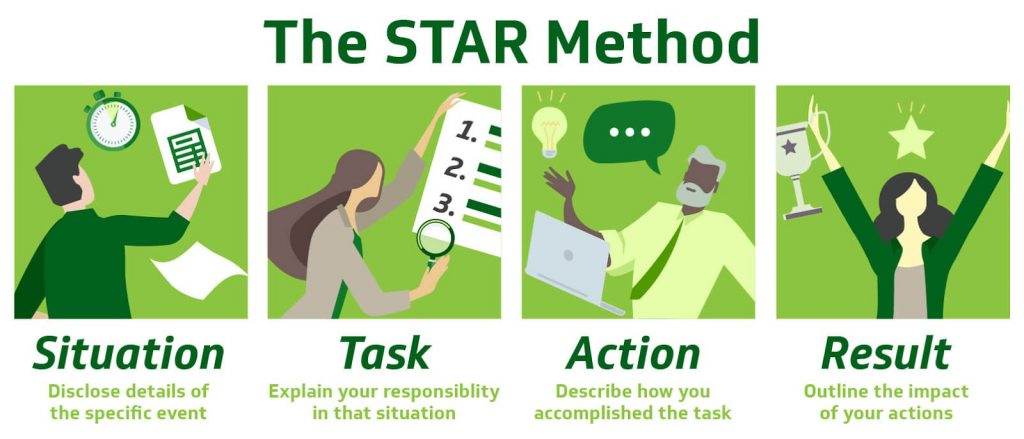
Final Tips & Tricks for an Ecommerce Job Interview
Ecommerce assistant interview questions aim to bring out the best in a candidate. Especially, if you’re filling in the position of a brand marketer, content manager, Amazon marketer, or anybody else controlling ecommerce operations processes while attracting new clients.
Here are a few final tips for an efficient ecommerce job interview:
- Don’t ask hypothetical questions or brain teasers. They will tell you nothing about the candidate’s skills and strengths and will only baffle your potential employee.
- Select team players. The role of an ecommerce manager requires strong soft skills. If your candidate isn’t a strong communicator and doesn’t possess analytical skills, the chances are they’ll drag your business down.
- Judge by accomplishments, not by titles. Your candidate might have worked on a number of projects. But unless they’re ready to show hands-on results of their work, it’s unlikely they’ll bring value to your project.
Good ecommerce managers need a blend of a strategic mind, operational expertise, and delivery mastery to spearhead the company’s growth. Interview deeply and choose wisely.
And if you plan to improve your online store and hire ecommerce developers, Elogic will gladly assist with an ecommerce project manager.


